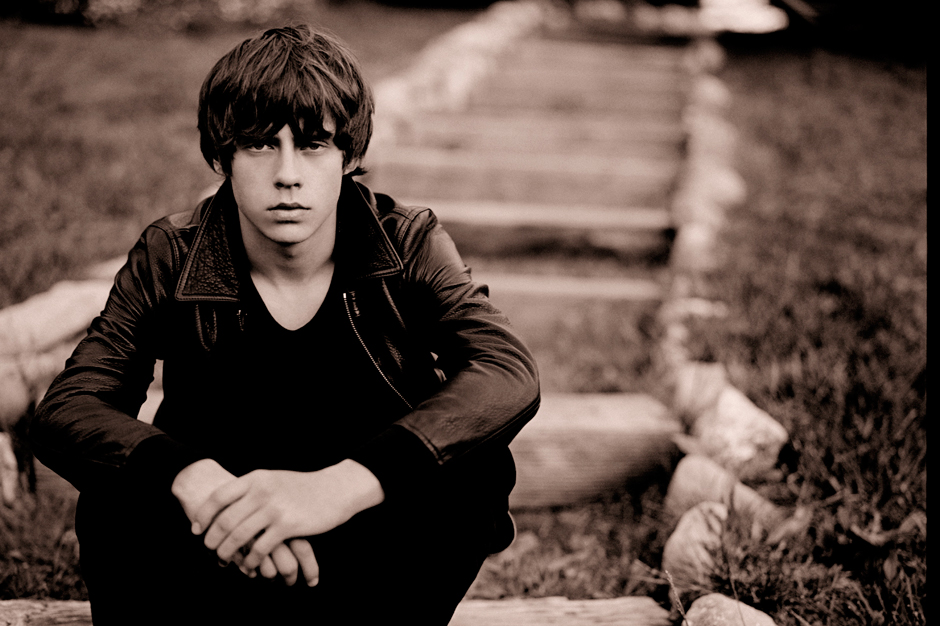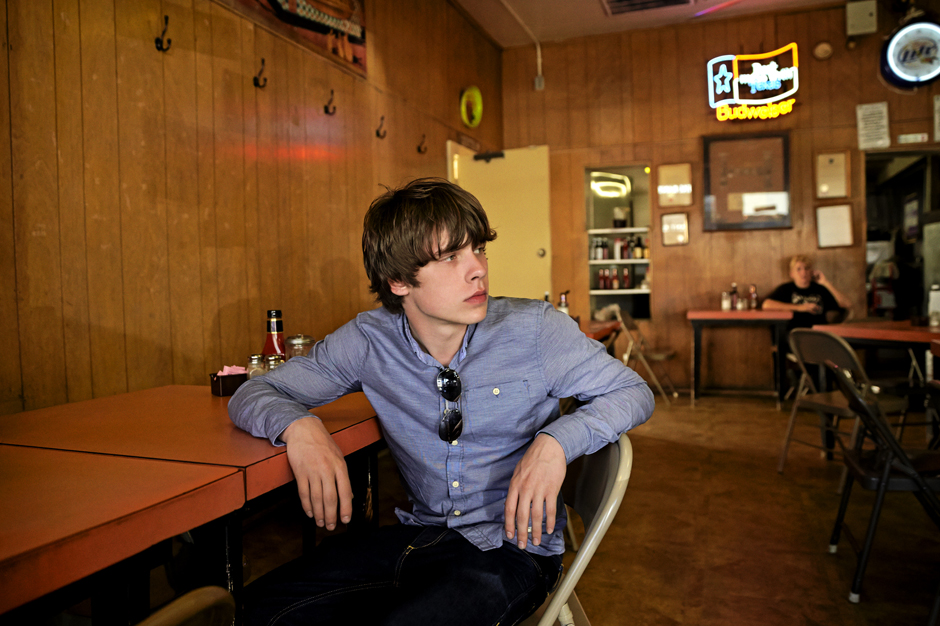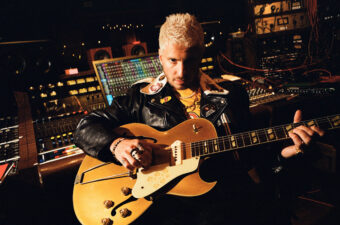Jake Bugg is a 19-year-old singer-songwriter out of working-class Nottingham, England, whose songs paint vivid and often violent images of bar fights, drugs, poverty, and heartbreak. His self-titled debut was a surprise success last year, supplanting Mumford and Sons atop the U.K. Albums Chart; his throwback guitar sounds, retro-streamlined production, and lyrical dexterity garnered the traditional tongue bath from the British press, but also earned him comparisons to heavyweights like Arctic Monkeys frontman Alex Turner (kinda sorta) and Bob Dylan (less so).
Vigorous touring followed, but during a break earlier this year, he holed up in Rick Rubin’s Malibu studio to record Shangri La, a follow-up LP that arrives this week courtesy of Island Records. It’s a more modern-sounding record — sonically dense, with punk rock flourishes — that finds Bugg improving on his ability to get at the heart of what’s ailing him, be it alienation, restlessness, or tweeting. No matter his target, he’s working with a newfound swagger.
SPIN called Bugg last week to discuss the making of Shangri La, questions of authenticity, and the troubles of being labeled a young anachronism. Listen to an exclusive stream of album cut “There’s a Beast and We All Feed It ” as you read.
https://cache.vevo.com/m/html/embed.html?video=GBUV71301627&sbId=4d61b777-8023-4191-9ede-497ed6c24647
Why did you put Shangri La out a year later, when you easily could have ridden the debut for a while longer?
It’s just a matter of songs that I came up with on the road, and the opportunity came up to record with Rick Rubin. I thought, “Well, my record had been out for a year. I think if I was listening to Jake Bugg, I would quite like him to put out a second body of work, and I’d be quite bored of the first one.”
Did you set out to do make Shangri La different from your debut?
Not really. Once you become conscious of it, it becomes more of a package — as opposed to something you just enjoy very naturally. So I just came with a load of ideas and shared it to Rick, and he dragged them out and made them into songs.
Did you and Rick ever sit down and discuss what you wanted it to sound like?
I like to see it as a vinyl, with six songs on side A and six songs on side B. I had a little idea, but I also wanted to see just what happened. We didn’t have to start recording ’til January, so we had time to see where things were going to go.
Was it different working with one producer this time, as opposed to the last record’s five?
Definitely. A lot of songs on the first record are demos. I think that first album feels like a list of songs, whereas this album is more of an entity.
I saw Brendan Benson on the writing credits, in addition to your usual partner, Iain Archer. How did that relationship develop?
Through my publishing — they just put it together. I went down to Nashville on a little trip with Iain. I was very skeptical about it: three blokes in a room with guitars. I was like, “Well, how on earth is this going to work?” But we started jamming around, and I shared a few riffs I had. It was cool. When I’m working with people, I never want to feel like the task is to write a song. It’s all just jamming around, like people used to do back in the day.
You’re a great guitarist. Did you try anything new stylistically?
I had a bit of a heavier sound, actually. There’s a bit more electric on it. On “Slumville,” “Kingpin,” and “Simple Pleasures,” there’s quite a bit of lead in it, which is interesting.
A song like “Kingpin” has much more swagger to it than anything on the first record. Did you find yourself in a different place lyrically?
After everything that happened, I started to see things in my old life from a completely different perspective. Before I did the first album, I’d never been out of England. But now, I’ve traveled around a bit more, meeting people and being in crazy scenarios I’d never thought I’d be In. I think I have more to write about.
Though you start with “There’s a Beast and We All Feed It,” which is pretty pointy toward critics.
That’s just being a part of the mechanical machine in any industry. Sometimes you don’t want to help the machine to carry on existing — but despite whether we want to or not, we can’t help but encourage it and give it something to feed on.
I’m sorry to bring this up, but your debut was received as though it was somehow more authentic than the other stuff on the charts at the time. Why do you think journalists lingered on questions of authenticity?
I’m just a guy that plays a few songs on the guitar. That’s what I love to do. For me, there’s a lot of generic pop stuff out there. I don’t know what to think about that. I just write my tunes and see what happens — if people listen, great. If not, then don’t listen, no one is forcing you. If you’re putting your soul into it, and you mean what you’re playing or what you’re singing, in my eyes that’s authentic. What’s not authentic is a record company getting a few good-looking girls or guys, and putting music in front of them that has no meaning or relevance to them whatsoever. They’re just singing. That, to me, is not authentic. That would be manufactured.
But on that first record, you had all those sonics, the grainy videos, and the troubadour thing — it made you sound like a singer-songwriter from the ’60s. Don’t you think that could come off as a bit of a put-on, too?
Not really, no. That’s just my influences. I’m influenced by old music. At the same time, I’m 19 years-old in 2013. I think people find it quite hard to believe that a 19-year-old has an album with sepia photographs. I can understand why people would want to tarnish the fact that it’s genuine, because it can’t seem possible in 2013. But it seems so to me. And I consider myself very fortunate for where I come from to be doing what I’ve always wanted to do — to live my dream. For some reason, the music that I enjoy playing and writing connected with people. That’s all it is. A record label could push something in front of people’s faces all they want, but if it puts people off… People like to feel, to a certain extent, like they discovered something themselves.
So how do you make sure you don’t lean too hard on the influences of the past?
Very simple: Don’t listen to them too much, and don’t listen to one thing. I branch out and listen to all kinds, whether that be hip-hop, classical, or heavy metal. The music I play just feels more natural to me. It takes a little bit of everything. Now, it’s so hard — people say the Beatles were the blank canvas, but they didn’t invent all of it. They only knew what they had: the old blues records, the Everlys. That’s the case now: It’s all about accumulation. There’s a very fine line between being influenced and imitating. And that’s the line you don’t want to cross.
For Shangri La, did you take cues from any specific records?
I was listening to quite a bit of early Neil Young, a bit of John Martyn, a bit of Nick Drake, a bit of Bill Withers, even though you might not be able to tell it. You should take something away from everything. That’s what I do: Try to learn as much from what little I have, and try to incorporate it into my own music. It has to come from you. I would never sing a song that has no relevance to me or have no meaning. How could I sing in front of those people who come to watch me play? I would be lying. I don’t want to lie to them.
But you also said that some music is more authentic — your word — than other music. How do you reconcile those two ideas?
Just, for example: You could get someone singing a really good song. But they don’t know what the fuck it means. A lot of these manufactured groups get teams of professional songwriters. That’s why you see about ten different producers and writers. I’m not disregarding the songs in any respect, just saying that the people singing them are not genuine. There’s always going to be generic pop crap around. But I suppose it complements the good stuff every time it comes up. You could go on all day, trying to get me to define what’s authentic and what’s not — I could go on all day as well. It’s just one of those things.





